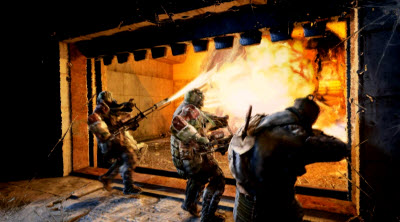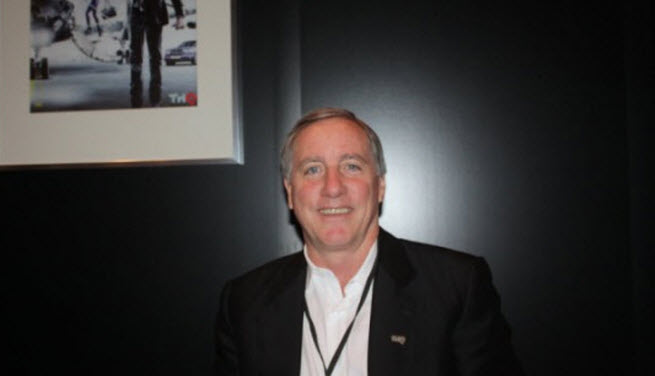Brian Farrell, chief executive of embattled video game publisher THQ, has endured a lot of criticism in the past year as investors have pummeled the company’s stock price and watched as Farrell has had to make cutback after cutback in staffing.
THQ’s bad bet on investing in the uDraw tablet cost the company a lot of money and forced it to accelerate a shift out of kids mass market games into hardcore titles for older players. The company’s revenues fell short during the holidays, and it has scaled back investments in its upcoming Warhammer 40,000: Dark Millennium, changing the format from a massively multiplayer online game to a single-player title.
Another blow landed last week as publishing rival Electronic Arts announced it had won the right to make Ultimate Fighting Championship video games, taking the mixed martial arts franchise away from THQ, a move that will affect THQ’s San Diego, Calif. studio.
But THQ has also had better-than-expected revenues recently, and it hired Jason Rubin, co-founder of Naughty Dog, as president to help turn around the company. We caught up with Farrell at the Electronic Entertainment Expo (E3), the industry’s largest trade show, last week. Here is an edited transcript of our interview.
GamesBeat: You have good games here at E3, but I know it’s been a tough year.
Brian Farrell: It’s been a tough year on a number of levels. We’ve had to completely reposition the company. As you know, for a long time, the kids business was part of our bread and butter. We recognized that the kids business was declining. In fairness, we didn’t move quickly enough out of that business, but now we’re out, totally focused on core, and I think you’re seeing the results here.
GamesBeat: Is there a way to figure out how to find where the bottom is for THQ and where your stable base will be?
Farrell: I think we have not only hit that bottom, but we’re starting to pull out a little bit. Don’t take my word for it, but if you look at our Q4 financial results, we look at that as a template for our future. We have high-quality games. A lot of the upside came from the digital downloads coming from Saints Row: The Third. So you ship a successful game, and the follow-on digital revenue is really strong. We had great cash flow as the result of those two things.
We’ve been talking about the focus word, but now look around. I don’t have to talk about it. Every one of the games we’re showing have some kind of awards or nominations hanging from them. The focus is working. Now, we’re not declaring victory yet. We have a boatload of work to do. But getting Jason Rubin was a huge win. He is a smart, creative, but disciplined guy who has a vision to do even better on the core side. We also share a vision for where the industry is going and where the core business is going on a digital level. I’m personally reenergized. I think a lot of the company is, too.
GamesBeat: It must be hard, still, to hear that the Internet at large is calling for your head. “Why is Brian still here?” or whatever. How do you work with that kind of criticism?
Farrell: [Chuckles] The good news or the bad news, depending on your point of view, is that I’ve been doing this a long time. I’ve been through these troughs before, and I’ve been through the peaks before. Both of those things, the peaks and the troughs, come from products, right?
When we hit good products, we bring a very successful company. And when we’ve not delivered good products, we’ve been in a failure state. In a failure state, I double down in terms of work ethic, dedication to the business. I feel personally responsible for where THQ is right now. I take full responsibility for that. But I’m also taking responsibility until relieved of command for making it work. I’ve done it before. I intend to do it again.
GamesBeat: I guess it still takes a while to change directions or to also make an impact. If you’re doing fewer, more high-impact games, then by necessity it’s going to take a while.
Farrell: I completely agree with that. If you think about what we’ve been saying over the last few months, it’s not a new strategy. It’s just getting there faster. Getting out of the kids business — we said we were heading in that direction, but given what happened with uDraw last year, we did it more immediately. So this is not a new concept, again, if you look at what we’ve done with the smaller slate of titles and the focus, I think you’re going to see a high level of quality on all of those.
Again, the products speak for themselves. Look around the booth and see what’s hanging from the walls. So we’re on that path, we’ve been on that path, and what Jason and I completely agree on. Obviously that’s not where he’s going to have his imprimatur. It’s just a little further out and also in the digital realm. The new business models are emerging. It’s a little too early to talk in specifics about it. But he has a point of view that I’m very supportive of that is right in line with what we’ve been talking about the last couple of years.
GamesBeat: How do you look at your slate as far as decisions that you guys have made? Clearly it’s more focused, they’re bigger games, each release looks better. What else would you observe about this?
Farrell: That’s the business model now, right? Let’s start with Darksiders. Launches in a couple of months. I think that’s another demonstration of our commitment to what we said we were going to do. We said quality core games in a good window. The team came to us a couple of months ago and said, you know, we knew the game was good, but to get it to where it needs to be, we need a couple more months. You know the financial situation of the company. Tough call. But I said, you know what? We said we’re going to do quality games, and we’re going to do quality games. Team, you have an additional two months. I think it’s going to be reflected in the quality.
And also, we checked around in terms of what’s a better window for launching the game? I personally picked up the phone with a couple of key retailers and said, you know, let’s make the right decision here. And we did the right thing for the product. Again, we said we were going to do it, we’re doing it.

One of the pleasant surprises for me this show was Metro. I’ve always been a fan. I don’t know if you remember all the way back to S.T.A.L.K.E.R. — then that same team left and formed a new team to do the original Metro for us. Once again, they needed a little more time with the game. We gave them the time. We’re going to put it away from all the other shooters coming out this holiday, away from Halo, away from Call of Duty.
I think we’re going to have a good window. It’s a unique product, right? Where can THQ stand out? Competing with 100-million-dollar budgets? Probably not. But a new world you’ve never been to before with a feeling and an ambiance that gamers can’t get elsewhere? That’s super cool about Metro. And gamers are recognizing it. So again, time, positioning in the market, competitive window release. We’re doing the right thing by our games.
GamesBeat: And then the UFC thing, was that predictable? Or was that a surprise?
Farrell: Well, it wasn’t a surprise to us. It was something that we were very interested in. We’ve been very clear. Our CFO Paul Pucino has said the break-even on a game is around two million units, plus or minus. We’ve also said that we’ve done about 1.4 million units of UFC 3. An 86-rated Metacritic game, you know what that means in the sports world — that’s really hard to do. Some people did connect those dots.
We were being asked a question: Why are you continuing on with this? Personally, I almost hate to admit this. I love the sport. I have a lot of respect for the Fertittas and Dana White. It’s been a great brand for us, but for us the ability to get cash and invest in things that are more core to our strategy, great for us. Will UFC be a better platform on EA Sports? I’m sure that’s the hope at EA and the UFC, and honestly, we wish them well. I hope to keep going to the events. It’s a win-win-win here.
GamesBeat: I guess it helps that you can get out from under some financial obligations there, that keep on ratcheting up on the marketing… That would have been a burden?
Farrell: Yeah, that and ongoing development on something that wasn’t working for us. Again, great brand, and again, we wish them very well, but again… I think all parties are absolutely delighted with the outcome.

